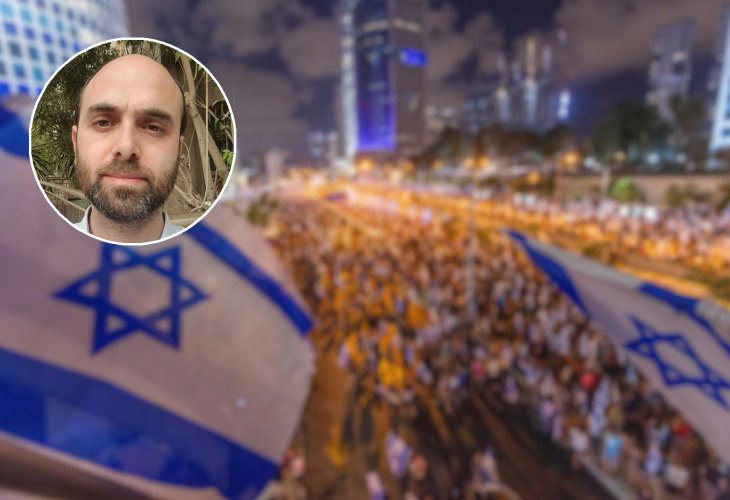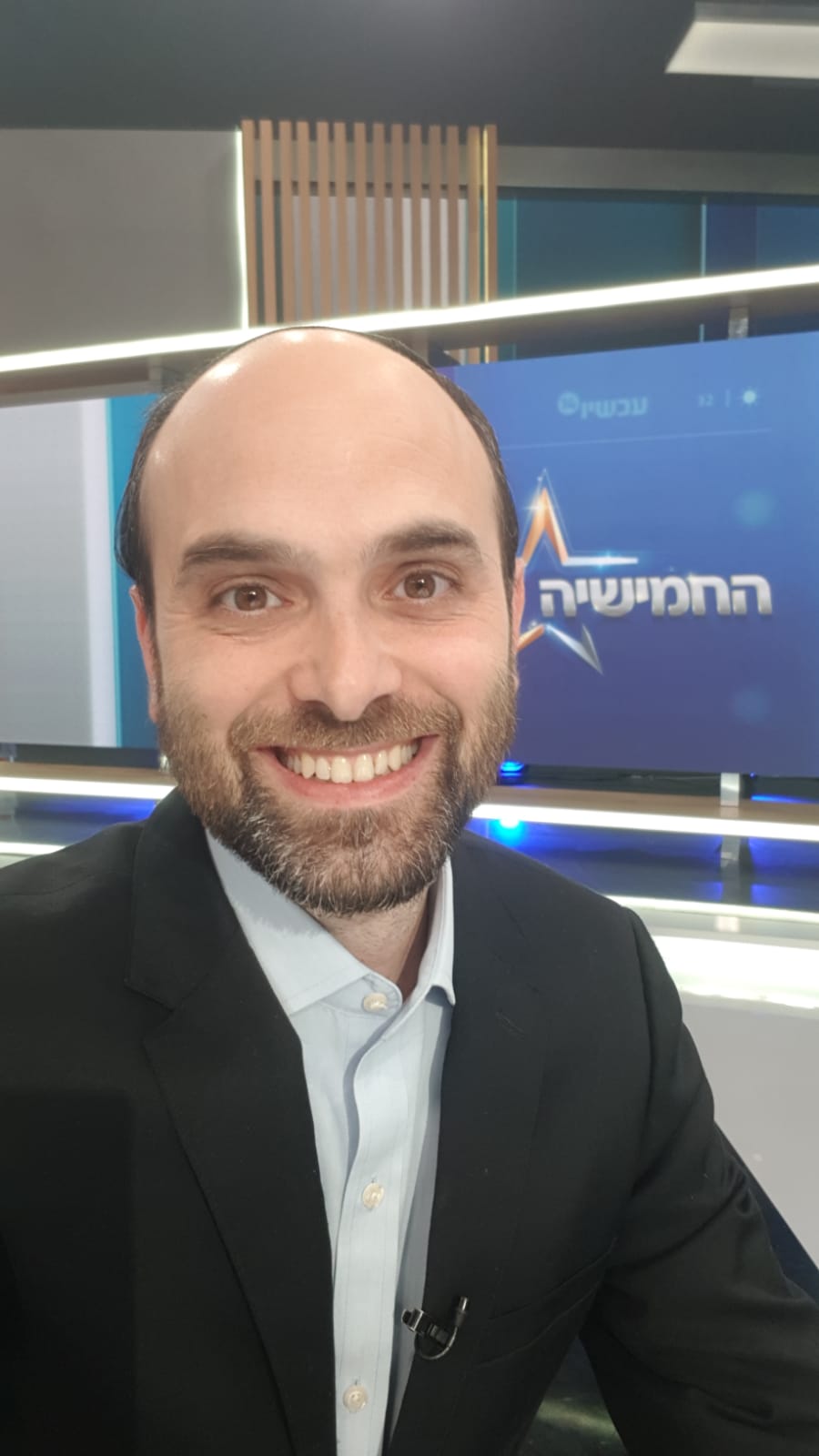"The Opposition to the Judicial Reform is Hypocritical. When Leftist Governments Did Things We Disliked - We Didn't Break the Tools"
Meni Geera-Schwartz is a senior Haredi communications consultant who has worked with numerous prominent figures and often represents the Haredi perspective in Israeli public discourse. In an interview with 'Hidabroot,' he discusses establishing the 'News Lines,' his pseudonym that became a part of his real name, and the significant challenges facing Haredi leadership.
 In the circle: Meni Geera-Schwartz (Background photo: Yossi Aloni / Flash 90)
In the circle: Meni Geera-Schwartz (Background photo: Yossi Aloni / Flash 90)"The truth is that we didn't think it would take off like this, but the crazy success of the News Lines surprised even us," confesses Menachem Mordechai Schwartz, better known by his media nickname, 'Meni Geera-Schwartz'. The News Lines revolutionized the media consumption of the Haredi community, and a spark of playfulness arises in Meni's eyes as he recounts the early days of this unique media entity.
"After several years in various roles within sacred channels, which were essentially pirate Haredi radio stations, I joined the founders of the News Lines. During that time, the idea of mobile phones also serving as radios began to develop, and we simply rode the wave. We used a telephone center that served as a news system. People would call the phone number and hear news and broadcasts. I partnered with the renowned Bichler brothers from the PR field, and with the help of a technology company, we created an inner Haredi content world, calling it 'The News Center, The Haredi Voice'. Today, the word 'News' has a gossip connotation, but back then, it meant news.
"We were essentially a full-fledged media entity. We had field reporters, and I served as the editor-in-chief. We provided updates from significant events – Haredi and general, we reported on the happenings in the court of Rebbes and Rabbis, and gradually we developed it more and more. Over the years, we had dozens of stories that opened newscasts nationwide, items that the country's biggest media outlets adopted after we exposed them. Back then, the general public was unaware of what was happening in the Haredi community, and suddenly we gave them a window. Understand that at that time, not even one Haredi radio station existed. 'Kol Chai' back then didn’t target the Haredi public, 'Kol Berama' wasn’t established yet, etc. I co-owned News Lines and served as the chief editor for ten years. At some point, Rabbis began opposing News Lines, and it was clear to me that I had to leave, and indeed shortly afterward, I left and never returned."

In the Halls of Holy Channels
A quick glance at Meni Schwartz, 41, married and father of four, residing in Jerusalem, reveals he perhaps slightly misses the action-packed days of the News Lines, but he claims to get satisfaction from his current endeavors. "In recent years, I've been working as a communications, strategy, and content consultant, primarily operating in the media and journalistic field."
When did your initial connection to the world of communication start?
"I was born into a Haredi Hasidic family, and from a young age, I loved listening to the radio and indeed listened a lot. When I was 16, some friends from yeshiva started working at holy channels, and they got me involved. This was around 1997, before any Haredi radio station existed in Israel. As a child, I dreamed of working in radio, and during one vacation break, I started volunteering as a producer at one of the stations. I loved the work there immensely; it was also illegal, adding intrigue. The radio manager, Rabbi Daniel Yom Tov, liked me, and I slowly progressed in the station, taking on more roles. To this day, I have great respect for him for what he did for me.
"Radio shows typically credit the technicians, etc., and before one of the shows, one of the presenters asked me what name to use for credits, and I said my name is Menachem Schwartz. During that period, nobody used their real name, partly because working in media wasn't accepted in the Haredi world, and also because it was illegal. So we decided on Meni for the first name. We were debating about the family name, when that presenter opened a disc in the station and saw the name of the arranger – David Geera, and said 'Alright, from today you're Meni Geera.' Later, I understood it was divine assistance because I don't know any other Haredi with such a surname, and it really created a unique name for me that over the years became the name the public recognizes me by. In practice, the pseudonym has integrated with the real one, and the 'Geera-Schwartz' has persisted."
After your initial experience at a pirate station, when did you start working in media more formally?
"I married young, at 19, and immediately after the wedding, I started working more steadily in radio. I moved to Radio Ten, which was the strongest among all the holy channels at the time, and received a regular salary. Subsequently, I got into 'Kol Chai' radio, which already operated as a Haredi radio, presented shows, and served as a radio analyst. After a year and a half, I began editing the 'Bechadrei Charedim' website for over three years, and since leaving there, I've been working as an independent communications and strategy consultant. Among others, I served as a communications consultant for public bodies, such as the Ministry of Health, Jerusalem Municipality, Meron Project, and also political figures like Itamar Ben Gvir, Yossi Deutsch, etc. Additionally, I worked as a founding consultant for 'Kol Chai Music', long before the station was established. I told radio CEO Avi Rosen we must establish a station that broadcasts only music. One of the few fields in communication I studied professionally was music hosting at Radio Tel Aviv. Thanks to this, I knew how to edit and host music, and explained to them how to build playlists, etc."
Challenges of Haredi Leadership
In recent months, Israel is experiencing a social crisis around the issue of judicial reform. This can't be missed, and in this context, Geera-Schwartz is one of the prominent voices on the right camp in general and for Haredim in particular. "I don't know where this crisis is heading," he says with disappointment. "I'm usually an optimistic person, but I really don't see how this matter resolves. What comforts and gives me hope is my belief in Hashem and knowing He's managing everything. There is no doubt we're in a crisis mainly due to the animosity between brothers. We weren't always friends with each other, but recently it has intensified. Very serious things are said from both sides, creating long-term damage. The younger generation sees what's happening, and fixing this will be hard. We have to show them there is tolerance and inclusion from both sides, and I, in my capacity, strive to do what I can."
What is your opinion on the camp opposing the judicial reform and their methods of opposition?
"There's great hypocrisy in all of this, and significant distortions. Everyone understands the deceit involved here. It can't be that if the government wants to change a certain law, those who don't support it claim it's the end of democracy. It's hypocrisy and deceit. We're not new to this, and when left-wing governments did big things we disliked, we didn't break the tools. Moreover, the discourse became very violent, and Yair Lapid plays a big part in this. His discourse is filled with venom, depicting a world where there are good and bad people, people of light and darkness. And yet, I think some representatives from the right aren't speaking respectfully enough, and the Haredi MKs have some behavior to correct as well.
"Although we live in Israel, and there's a flourishing of the Torah world, we must consider that alongside us are many people unaware of the beauty of Torah and mitzvot or uninterested in them. Hence, sometimes what we say as Haredim and religious people can cause a desecration of Hashem's name. We need to say and do things in a way that is loved and accepted. I'm not saying we can't speak, but it's a question of how and what you say. Our representatives aren’t always aware of how their texts are received; almost everything can be said respectfully or not. As a Torah-observant Jew, you must do everything to sanctify Hashem's name, especially in sensitive times like these."
Many protesters against the reform express fear of Haredim. What do you think is at the core of this issue?
"A big part driving the protesters is genuine fear of the Haredi society and its growth. People are afraid there will be religious coercion, but there's no such ideal among Haredim. From our perspective, we're still in exile, and having a halachic state isn't our ideal. The state itself isn't an ideal for us; we didn't come here to establish a state. We are happy with the state, partake in it, but don't sanctify it. Many from religious Zionism, by the way, would indeed want such changes in the state, but as a whole, Haredim don't have such aspirations.
 (Photo: Chaim Goldberg / Flash 90)
(Photo: Chaim Goldberg / Flash 90)"Yet I can say I recognize genuine pain among reform supporters, people with much anger towards Haredim. When you show people real graphs displaying an economic reality where Haredim are growing, with Haredim earning less and seculars more, it's a problem. We live with faith that Hashem manages everything, including the economy, and that Torah study brings blessings, but some people don't believe in that, and this situation hurts them. I believe the Haredi leadership must address this. Perhaps through explanation, maybe by encouraging work among those not learning, emphasizing the Haredi community's contribution, whatever they see fit. It's a problem needing a solution, and we can't say, 'We live in our communities, and the rest of Israel doesn't interest us.' We must do whatever we can so that His great name may be exalted and sanctified."

